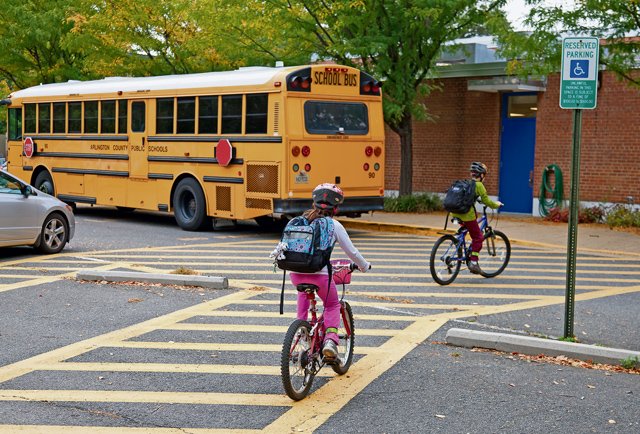
Since the invention of the first bike in the 1800s, bike riding has become a popular form of transportation, enjoyment, and physical activity.
Yet it can also be a dangerous one.
The Centers for Disease Control and Prevention reports that nearly 1,000 bicyclists die every year, and more than 130,000 are injured in bike crashes across the United States.
According to the CDC, this implies a heavy cost — exceeding $23 billion annually — in health care, lost work, loss of quality of life, and lost lives.
To make your bike riding experience fun and safe, remember to “learn and know the laws in your community, and follow them,” said U.S. Air Force Staff Sgt. Taylor Boeckel, occupational safety manager at Joint Base Pearl Harbor-Hickam, located close to Honolulu, Hawaii.
“Wearing personal protective gear is always important, from a new rider to the most experienced of riders,” she added. “Make sure you know how to obey traffic laws and lights.”
Protective equipment is also mandatory at all military installations, which have programs that specifically address bike safety.
These include regulations common to all services and apply whether on or off a military installation, such as requiring service members and families to always wear Consumer Product Safety Commission-approved bike helmets, reflective upper outer garments, and equipping bicycles with operable head and taillights during hours of reduced visibility, among others.
Boeckel highlighted that protection and complying with traffic laws is especially important for children on bikes.
“Not all of them know or understand the traffic laws, so it’s important for the parents [or caretakers] to teach them,” she said.
She had safety advice for seasoned riders, too:
“Don’t get complacent with laws once you get comfortable with your routine,” she said. “For riders who ride the same path every day, it may be easy to become very comfortable with that route and start cutting corners such as not stopping when necessary.”
Ensuring your bike is always in top shape is also important year-round, she said.
“Tires wear even while in storage,” so it’s important to make sure they are in optimal riding condition.
“Do a bike check prior to each ride, just as you would your vehicle,” she said. “Check your tires and brakes for operation.”
Tips to remember
Here are the top five tips Boeckel recommends all riders should always keep in mind:
- Stay vigilant.
- Don’t allow yourself to become distracted while riding.
- Stay highly visible both at night and during the day.
- Obey all traffic laws.
- Always wear your personal protective equipment, such as a helmet and closed shoes for better control of the pedals.
Like driving a car, riding your bike requires relying on your senses to keep you alert and aware. This means not engaging in distracting activities or wearing earphones or other listening devices while you’re on your bike, according to the U.S. Army’s Safety Program.
It also means not consuming substances that may alter your state, such as drinking. According to CDC, about one-third of crashes that result in a bicyclist’s death involve alcohol for the motor vehicle driver and/or bicyclist.
Additional safety recommendations include:
- Watch the road for traffic and pedestrians.
- Always make yourself visible to others.
- Listen for other vehicles and people.
- Stay in your lane
- Always hold on to both handlebars for better balance and control, especially in case you need to break suddenly.
Yet it’s not only bike riders that must be on the lookout, explained Boeckel. Vehicle drivers must always be on the lookout for bicycles as well.
And while some cities may have well defined bike lanes, many others don’t.
“Always be a defensive driver, meaning be on the lookout for the other guy” added Boeckel.
Most importantly, Boeckel recommends children and minors never ride without supervision. “Teaching children how to be safe and supervising them” as they’re on their bikes, is key to building early awareness.
For more information on how to be safe on your bike, talk to your installation’s safety management team.


